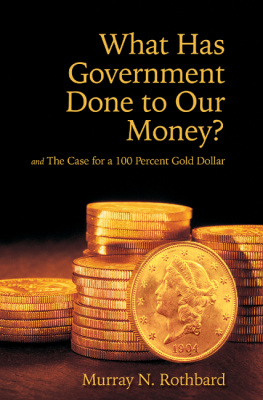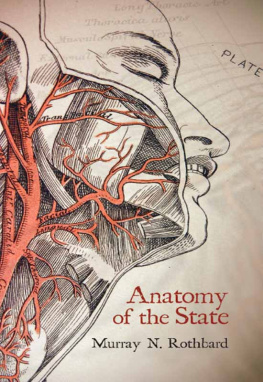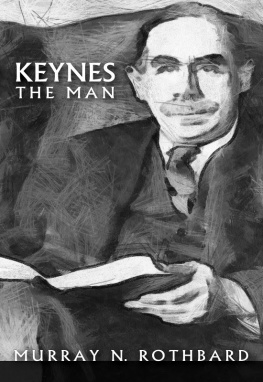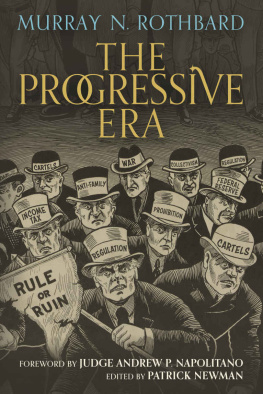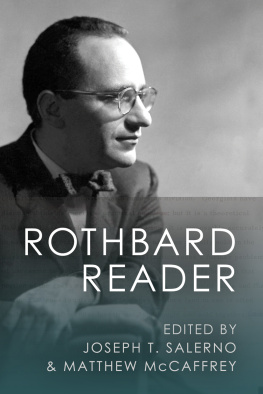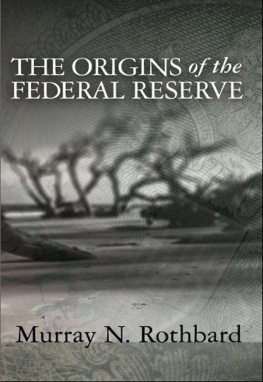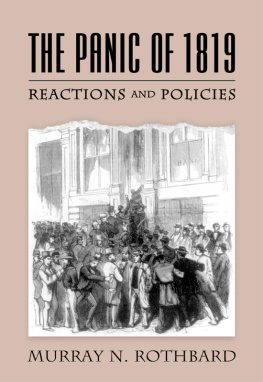
Mises Institute , founded in 1982, is a teaching and research center for the study of Austrian economics, libertarian and classical liberal political theory, and peaceful international relations. In support of the school of thought represented by Ludwig von Mises, Murray N. Rothbard, Henry Hazlitt, and F.A. Hayek, we publish books and journals, sponsor student and professional conferences, and provide online education. Mises.org is a vast resource of free material for anyone in the world interested in these ideas. For we seek a radical shift in the intellectual climate, away from statism and toward a private property order.
For more information, see , or phone us at 1.800.OF.MISES.
Mises Institute
518 West Magnolia Avenue
Auburn, Alabama 36832
Previously unpublished in March 1959.
Published 2015 by the Mises Institute. This work is licensed under a Creative Commons Attribution-NonCommercial-NoDerivs 4.0 International License.
http://creativecommons.org/licenses/by-nc-nd/4.0/
Mises Institute
518 West Magnolia Avenue
Auburn, Alabama 36832
mises.org
eISBN: 978-1-61016-638-6
Preface
When Murray Rothbard wrote Science, Technology, and Government in 1959, supporters of the free market needed to confront a challenge that remains relevant today. In 1957, the Soviet Union launched its Sputnik satellite, thereby defeating the United States in the race between the two countries to be first into space. Did this victory show, or at least suggest, the superiority of Soviet centrally-planned science to the American market economy? Critics of the free enterprise system like John Kenneth Galbraith (one of Rothbards least favorite economists) claimed that scientific research and development required government planning and control. The free market, these critics claimed, could not carry out the vast efforts research now required. Could private enterprise have built the atomic bomb? The Soviets have long since departed, but the fallacies in the arguments for centrally-controlled science live on today. Government spending on science and technology has increased far beyond its level in 1959.
In this brilliant monograph, Rothbard deftly turns the tables on the supporters of big government. In doing so, he displays his unique combination of mastery of theoretical principles and commanding knowledge of the empirical evidence and scholarly literature on every subject he addresses. He shows that science best advances under the free market: the claims to the contrary of the centralizers are spurious.
He begins with a fundamental question: how do we decide how much money to spend on research. The more we spend, the less we have to spend on other things. The decision is best left to the free market:
This fact of reality, then, must be faced: if there are to be more scientists, or more scientific research, then there must be less people and less resources available for producing all the other goods and services of the economy. The crucial question, then, is: how much? How many people and how much capital are to be funneled into each of the various occupations, including science and technology? One of the great, if often unsung, merits of the free enterprise economy is that it alone can insure a smooth, rational distribution and allocation of productive resources. Through the free price systems, consumers signal laborers, capitalists, and businessmen on which occupations are most urgently needed, and the intricate, automatic workings of the price system convey these messages to everyone, thereby creating an efficient, smoothly working economy. (p. 16)
If an objector says to this, But hasnt the free market, which you praise, resulted in a shortage of scientists?, Rothbard has a devastating answer; What shortage?
If then, there is a shortage of scientists, market salaries for scientists will significantly rise, relative to other occupations. But since they have not so risen, is there really a shortage for scientists? This question was itself scientifically investigated only recently ... since 1939, salaries of engineers relative to earnings of doctors, dentists and lawyers, have declined, and have also declined relative to manufacturing wage earners. Even the salaries of clergymen, pharmacists, and school teachers, rose relative to engineers in this period. How, then, can there be a shortage of engineers? (pp. 2930)
Even if there is no shortage of scientists, though, does it not remain the case that in current conditions, advances in scientific knowledge require gargantuan efforts beyond the scope of the free market? Rothbard meets this dogma head on:
The myth has arisen that government research is made necessary by our technological age, because only planned, directed, large-scale "team" research can produce important inventions of develop them properly. The day of the individual or small-scale inventor is supposedly over and done with. And the strong inference is that government, as potentially the largest-scale operator, must play a leading role in even non-military scientific research. This common myth has been completely exploded by the researches of John Jewkes, David Sawers, and Richard Stillerman in their highly important recent work. Taking sixty-one of the most important inventions of the twentieth century ... Jewkes et. al. found that more than half of these were the work of individual inventorswith the individuals working at their own directions, and with very limited resources. (p. 47)
Not even the building of the atomic bomb is an exception to the superiority of the free market to governmentally-controlled science.
The fundamental atomic discoveries had been made by academic scientists working with simple equipment. One of the greatest of these scientists has commented: "we could not afford elaborate equipment, so we had to think." Furthermore, virtually the entire early work on atomic energy, up to the end of 1940, was financed by private foundations and universities. And the development of the bomb was, for peacetime purposes, an extremely wasteful process. (p. 85)
The alleged great achievements of Soviet science, including the much-vaunted Sputnik, failed to impress Rothbard:
We have heard a great deal recently about the alleged glories of Soviet science, and about the necessity of the United States catching up with such wonders as sputniks. What is the real record of Soviet science? Professor [John R.] Baker, analyzing this record, shows that, at the beginnings of the Soviet Union, the old pre-revolutionary scientists continued to do well, largely because science was not yet under government planning. That came with the Second Five-Year Plan, in 1932.... Government control of science, government planning of science, is bound to result in the politicization of science, the substitute of political goals and political criteria for scientific ones. Even pro-Soviet scientists have admitted that Soviet research is inferior to American, that basic, as contrasted to applied, research, is neglected; that there is too much red tape; that little fundamentally creative work has been done; and that science is unduly governed by political considerationssuch as the political views of the scientist propounding any given theory. Scientists are shot for taking the view that happens to be in political disfavor. (pp. 7172).
So far as Sputnik is concerned, American satellites have far superior instrumentation, and are therefore much more important scientifically. (p. 75)
Given his opposition to governmentally-controlled science, it is no surprise that Rothbard thinks that the best course of action for government is to get out of the way of the creative activities of the free market. It should, for example, reduce taxes to the greatest extent possible. In this connection, Rothbard in a brilliant paragraph exposes a common fallacy:
Next page



